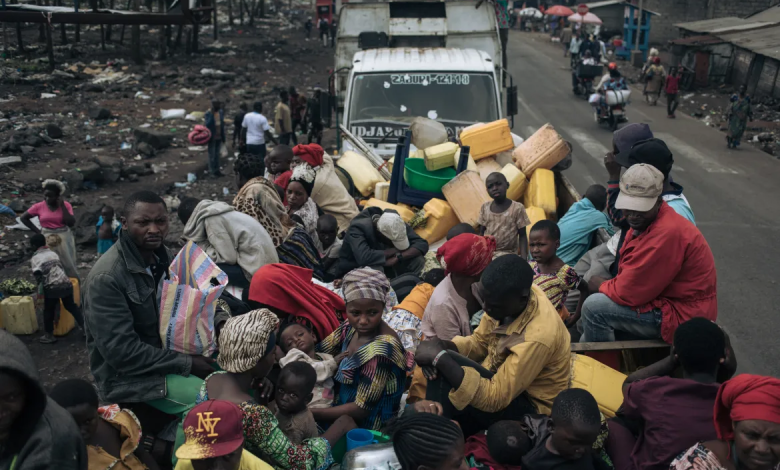60,000 Displaced Persons Seek Refuge in Obokote Amid M23 Violence – Report
The displaced persons from North and South Kivu find shelter in makeshift accommodations, including the homes of benevolent families, schools, churches, abandoned buildings, and even the forest.

The recent surge in violence by the M23 rebel group in North and South Kivu has led to a massive displacement of people, with approximately 60,000 displaced persons recorded in Obokote alone.
According to the Obokote Rural Health Zone’s Q1 2025 report made available to journalists on Thursday, the zone is struggling to cope with a massive influx of displaced persons, with numbers surging in March, particularly from areas such as Walikale, Mubi, and Lubutu, Biruwe, Ondofia, Makana, and Oso.
The displaced persons find shelter in makeshift accommodations, including the homes of benevolent families, schools, churches, abandoned buildings, and even the forest.
“Up till now, no assistance has been given to these vulnerable populations among whom are a large number of children and women,” part of the report read.
This alarming number is part of a larger crisis, as millions of internally displaced persons (IDPs) are recorded in the Democratic Republic of Congo.
The situation is dire, with many displaced people facing significant challenges in accessing basic necessities like food, shelter, and healthcare.
Local authorities in Obokote have also indicated that some women were sexually violated, while many also battle some illnesses such as acute renal failure, malaria, typhoid fever, and diarrhea.
Portable water from taps, food, and hygienic latrines, according to the report, are very serious problems in Obokote as medical personnel, materials, and health infrastructures are becoming insufficient.
Obokote is situated in Lubutu territory, which has two health zones, namely Lubutu and Obokote. In the Lubutu health zone, the difficulties are the same, and the displaced populations live in dire conditions.
The M23 rebel group's violence in North and South Kivu has caused a large-scale displacement crisis, with around 60,000 individuals displaced in Obokote alone.
The Obokote Rural Health Zone is overwhelmed by the influx, as people from places like Walikale and Lubutu seek refuge in makeshift accommodations.
Despite the vulnerability of women and children among the displaced, no assistance has been provided, leading to severe shortages of food, shelter, and healthcare. Many are battling diseases such as malaria and typhoid fever, with women facing sexual violence.
The critical lack of clean water, food, and proper sanitation is compounded by insufficient medical personnel and infrastructure. This crisis in Obokote reflects widespread displacement issues in the Democratic Republic of Congo, affecting millions.
Support Our Journalism
There are millions of ordinary people affected by conflict in Africa whose stories are missing in the mainstream media. HumAngle is determined to tell those challenging and under-reported stories, hoping that the people impacted by these conflicts will find the safety and security they deserve.
To ensure that we continue to provide public service coverage, we have a small favour to ask you. We want you to be part of our journalistic endeavour by contributing a token to us.
Your donation will further promote a robust, free, and independent media.
Donate HereStay Closer To The Stories That Matter




